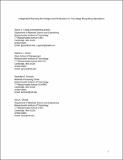| dc.contributor.author | Chang, Jiyoun Christina | |
| dc.contributor.author | Graves, Stephen C | |
| dc.contributor.author | Kirchain Jr, Randolph E | |
| dc.contributor.author | Olivetti, Elsa A. | |
| dc.date.accessioned | 2020-03-03T19:46:06Z | |
| dc.date.available | 2020-03-03T19:46:06Z | |
| dc.date.issued | 2018-08 | |
| dc.date.submitted | 2018-07 | |
| dc.identifier.issn | 0377-2217 | |
| dc.identifier.uri | https://hdl.handle.net/1721.1/123987 | |
| dc.description.abstract | Recycling is a key strategy to reduce the environmental impact associated with industrial resource use. Recent improvements in materials recovery technologies offer the possibility for recouping additional value from recycling. However, incorporation of secondary raw materials into production may be constrained by operational complexity in two-stage blending processes. In this paper, we derive an analytical solution to demonstrate the importance of integrated planning (IP) approaches for two-stage blending operations in recycling. Our results suggest that the quality of materials obtained from the first stage strongly influences performance in the second stage. Current disjointed planning (DP) approaches in the recycling industry, where individual stages are independently planned without decision-making about intermediate blend design, overlook this interaction and, therefore, make conservative use of lower quality materials. We develop an IP model using a formulation of the pooling problem and apply it to an industrial-scale aluminum recycling facility located in Europe. The results suggest that the IP model can reduce material costs by more than 5%, for the case examined, and can enable increased use of undervalued raw materials. This study also investigates the impact of variations in operational conditions on the benefits of IP. Keywords: Production; Material recycling; Integrated planning; Two-stage blending process (pooling problem); Design of intermediate products | en_US |
| dc.description.sponsorship | National Science Foundation (U.S.) (Award 1605050) | en_US |
| dc.description.sponsorship | Fundação para a Ciência e a Tecnologia (Project MITP-TB/PFM/0005/2013) | en_US |
| dc.language.iso | en_US | |
| dc.publisher | Elsevier BV | en_US |
| dc.relation.isversionof | http://dx.doi.org/10.1016/j.ejor.2018.08.022 | en_US |
| dc.rights | Creative Commons Attribution-NonCommercial-NoDerivs License | en_US |
| dc.rights.uri | http://creativecommons.org/licenses/by-nc-nd/4.0/ | en_US |
| dc.source | Graves, Stephen C. | en_US |
| dc.title | Integrated Planning for Design and Production in Two-Stage Recycling Operations | en_US |
| dc.title.alternative | Integrated planning for design and production in two-stage recycling operations | en_US |
| dc.type | Article | en_US |
| dc.identifier.citation | Chang, Jiyoun C. et al. "Integrated planning for design and production in two-stage recycling operations." European Journal of Operational Research, 273, 2 (March 2019): 535-547. | en_US |
| dc.contributor.department | Massachusetts Institute of Technology. Department of Materials Science and Engineering | en_US |
| dc.contributor.department | Sloan School of Management | en_US |
| dc.contributor.department | MIT Materials Research Laboratory | en_US |
| dc.contributor.approver | Graves, Stephen C. | en_US |
| dc.relation.journal | European Journal of Operational Research | en_US |
| dc.eprint.version | Author's final manuscript | en_US |
| dc.type.uri | http://purl.org/eprint/type/JournalArticle | en_US |
| eprint.status | http://purl.org/eprint/status/PeerReviewed | en_US |
| dspace.embargo.terms | N | en_US |
| dspace.date.submission | 2019-04-04T14:12:31Z | |
| mit.journal.volume | 273 | en_US |
| mit.journal.issue | 2 | en_US |
| mit.license | OPEN_ACCESS_POLICY | |
| mit.metadata.status | Complete | |
